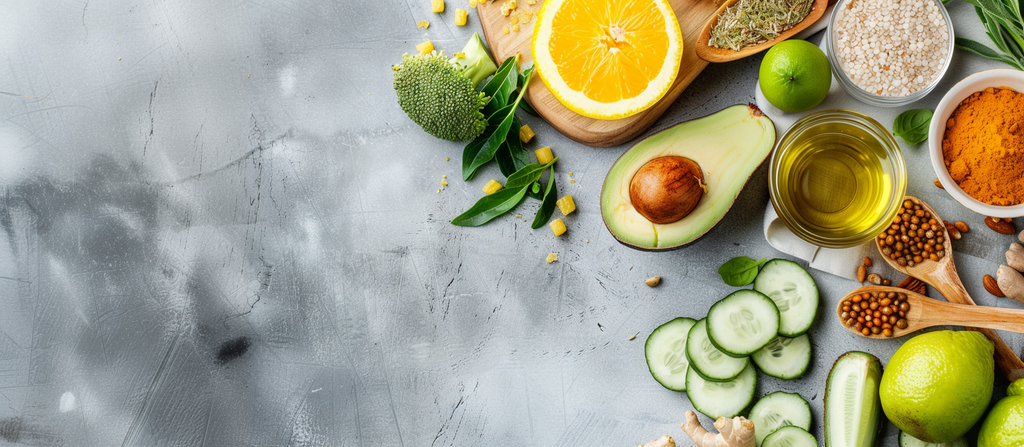Living in a toxic world doesn’t mean we have to live toxic lives. By understanding the impact of environmental toxins on our health and taking proactive steps to support our body’s natural detoxification processes, we can protect and enhance our health.
| What are environmental toxins? | Physical, chemical, and biological pollutants that can harm our health. |
|---|---|
| How do environmental toxins affect our health? | They can disrupt our body's natural detoxification processes, leading to a variety of health problems. |
| What is detoxification? | The body's natural process of removing toxins and waste products. |
| How can I support my body's natural detoxification? | Through diet, lifestyle changes, and herbal remedies. |
| What are some examples of detox drinks? | Lemon water, green tea, dandelion tea, milk thistle tea. |
| What are some liver detox strategies? | Consume liver-supportive foods like cruciferous vegetables, beets, and garlic. |
| What is a detox cleanse? | A short-term program designed to eliminate toxins from the body. |
| What are some tips for a healthy dopamine detox? | Reduce screen time, prioritize sleep, and exercise regularly. |
| What is heavy metal detox? | The process of removing heavy metals from the body. |

As a naturopath with years of experience, I understand the importance of maintaining a healthy body in a world increasingly burdened by environmental toxins. These toxins, found in the air we breathe, the food we eat, and the water we drink, can have significant impacts on our health. This guide aims to provide a look at the impact of environmental toxins on health and offer strategies to support the body’s natural detoxification processes through diet, lifestyle, and herbal remedies.
Understanding Environmental Toxins and Their Impact
Environmental toxins come in many forms, including:
- Heavy metals: Lead, mercury, arsenic, and cadmium can accumulate in the body and damage organs over time.
- Pesticides and herbicides: These chemicals are used in agriculture and can contaminate our food and water.
- Industrial chemicals: These chemicals are released into the environment from factories and other industrial facilities.
- Air and water pollution: Pollutants in the air and water we breathe and drink can irritate our respiratory system and damage our cells.
- Microplastics: These tiny plastic particles are found in our food, water, and even the air we breathe. Their long-term health effects are still being studied.
Detoxification: Your Body's Natural Defense System
Our bodies are equipped with a sophisticated detoxification system that works tirelessly to remove toxins and waste products. The liver, kidneys, skin, lungs, and lymphatic system all play a role in this process.
- The liver is the primary organ responsible for detoxification. It filters toxins from the bloodstream and neutralizes them before they can damage other organs.
- The kidneys filter waste products from the blood and excrete them in urine.
- The skin eliminates toxins through sweat.
- The lungs remove toxins from the air we breathe.
- The lymphatic system helps to transport toxins and waste products to the lymph nodes, where they can be eliminated.

Supporting Your Body's Natural Detoxification
While we can't avoid environmental toxins entirely, there are steps we can take to support our body's natural detoxification processes:
-
Diet:
- Eat plenty of fruits and vegetables: Fruits and vegetables are rich in antioxidants, which help to neutralize free radicals and protect our cells from damage.
- Choose organic produce whenever possible: Organic produce is less likely to contain pesticide residues.
- Consume whole grains and fiber-rich foods: Fiber helps to move toxins through the digestive system and eliminate them from the body.
- Limit processed foods, sugary drinks, and unhealthy fats: These foods can burden the liver and hinder detoxification.
- Consider adding liver-supportive foods to your diet: Cruciferous vegetables like broccoli and cauliflower, beets, and garlic are all excellent for liver health.
-
Lifestyle:
- Get regular exercise: Exercise helps to promote sweating, which is one way the body eliminates toxins.
- Drink plenty of water: Water helps to flush toxins out of the body. Aim for eight glasses of water per day.
- Get enough sleep: When we sleep, our bodies have a chance to repair and detoxify themselves.
- Manage stress: Chronic stress can impair the body's ability to detoxify. Find healthy ways to manage stress, such as yoga, meditation, or spending time in nature.
-
Minimize exposure to toxins:
- Use natural cleaning products instead of harsh chemicals.
- Avoid smoking and secondhand smoke.
- Filter your drinking water.
- Wash your hands frequently.
A Naturopath's Recommendation
Boosting Gut Health: Reducing inflammation in the gut can help your overall wellbeing. Slippery Elm, Aloe Vera and even organic apple cider vinegar can all help in reducing inflammation in the gut.Heart Health: Antioxidants called polyphenols may play a role in reducing the risks for atherosclerosis (artery hardening), stabilizing blood pressure, and reducing cholesterol levels.
Hormonal Imbalances: Dietary changes and nutritional corrections such as balancing your protein, carbohydrate and fat intake; can make a profound difference in conditions such as premenstrual syndrome (PMS), PCOS, Endometriosis, fertility planning and menopause.

Herbal Remedies for Detoxification
Here are some commonly used options to discuss with a registered naturopath or herbalist:
-
Dandelion: Dandelion is a well-known herb that supports detoxification. It increases diuresis (urine production), but recent studies also indicate it can improve liver and gall function.
-
Burdock Root: Burdock root assists in detoxification. It has been used for many years, especially in Asia, as a medicine against various ailments. It increases diuresis and helps the body get rid of toxins.
-
Milk Thistle: Perhaps the most well-known herb in this category, milk thistle supports liver function. Its most active substance, silymarin, activates specific metabolic paths of detoxification.
-
Cilantro: Cilantro binds to heavy and toxic metals that enter the body and removes them! Cilantro seeds make for an aromatic and tasty beverage, which can also be beneficial in controlling cholesterol levels and reducing acne.
-
Red Clover: Red clover can be an essential detoxification tool. It can purify the blood and get rid of toxins through the skin, kidneys, or intestine. It possesses strong antimicrobial properties that are especially effective against bacterial and viral infections.
-
Stinging Nettle: Stinging nettle acts like a diuretic herb; it purifies the blood and boosts metabolism. This herb is also a great source of calcium, sodium, iron, and vitamins A and C.
-
Garlic: Garlic can help the body get rid of toxins. This tiny but powerful bulb can support the natural mechanism of the body of destroying foreign cells.
- Ginger: Ginger can not only heal the body during a hangover but can also protect it from toxin overload.
Remember, it’s always important to consult with a healthcare professional before starting any new health regimen, including herbal detoxification. These herbs can be powerful, and it’s essential to use them safely and appropriately.

Detox Drinks: A Refreshing Start, Not a Magic Bullet
Detox drinks like lemon water, green tea, or dandelion tea can be a refreshing way to support hydration and potentially provide some antioxidants. However, it's important to understand that they are not a magic bullet for detoxification. A healthy diet and lifestyle are essential for supporting your body's natural detoxification processes.
Liver Detox: Nourish and Support
Liver detox isn't about a quick fix, but rather about nourishing and supporting your liver function. Here are some tips beyond the liver-supportive foods mentioned earlier:
- Limit alcohol consumption: Alcohol is a toxin that can damage the liver.
- Avoid sugary drinks: Sugary drinks can contribute to fatty liver disease.
- Get screened for hepatitis: Hepatitis is a viral infection that can damage the liver.
Detox Cleanses: Proceed with Caution
Detox cleanses are short-term programs that often involve restrictive diets, fasting, or herbal supplements. While they may be tempting, there is limited scientific evidence to support their effectiveness and safety. In some cases, cleanses can even be harmful, leading to dehydration, electrolyte imbalance, and nutrient deficiencies.
Dopamine Detox: Reclaim Control
A dopamine detox isn't about completely eliminating dopamine, a neurotransmitter essential for motivation, pleasure, and reward. It's more about recognizing and reducing activities that lead to an unhealthy overstimulation of dopamine receptors. Here are some tips for a healthy dopamine detox:
- Reduce screen time: The constant stimulation from screens can lead to dopamine dysregulation.
- Prioritize sleep: When we're well-rested, our dopamine levels naturally regulate.
- Exercise regularly: Exercise is a natural mood booster and can help to improve dopamine sensitivity.
- Engage in meaningful activities: Pursue hobbies and interests that bring you joy and a sense of accomplishment.
Heavy Metal Detox: A Personalized Approach
Heavy metal detox is a complex process that should be undertaken under the guidance of a qualified healthcare professional. There are various methods for heavy metal detoxification, and the best approach will depend on the type and level of heavy metal exposure.

Conclusion: Empowering Your Body's Natural Detoxification
By following the tips outlined above, you can empower your body's natural detoxification system and promote overall health and wellbeing. Remember, detoxification is a journey, not a destination. By making sustainable changes to your diet and lifestyle, you can support your body's natural ability to eliminate toxins and thrive in an increasingly toxic world.
Disclaimer: This information is for educational purposes only and is not intended to diagnose or treat any medical condition. Please consult with a qualified healthcare professional before making any changes to your diet or lifestyle.











